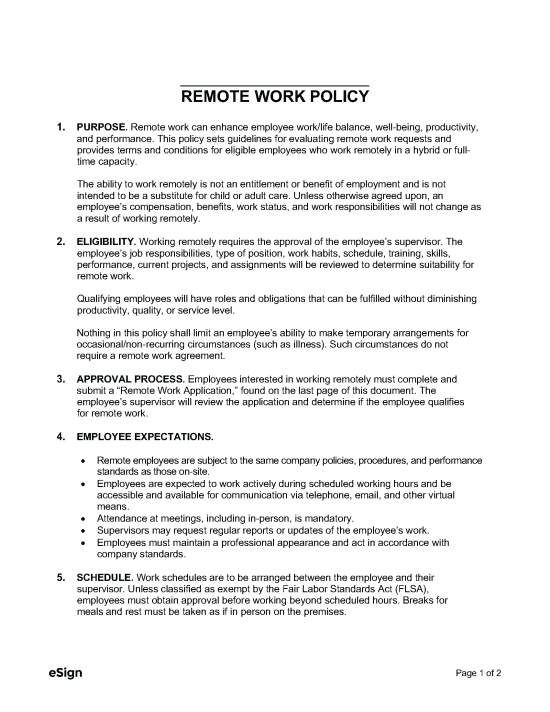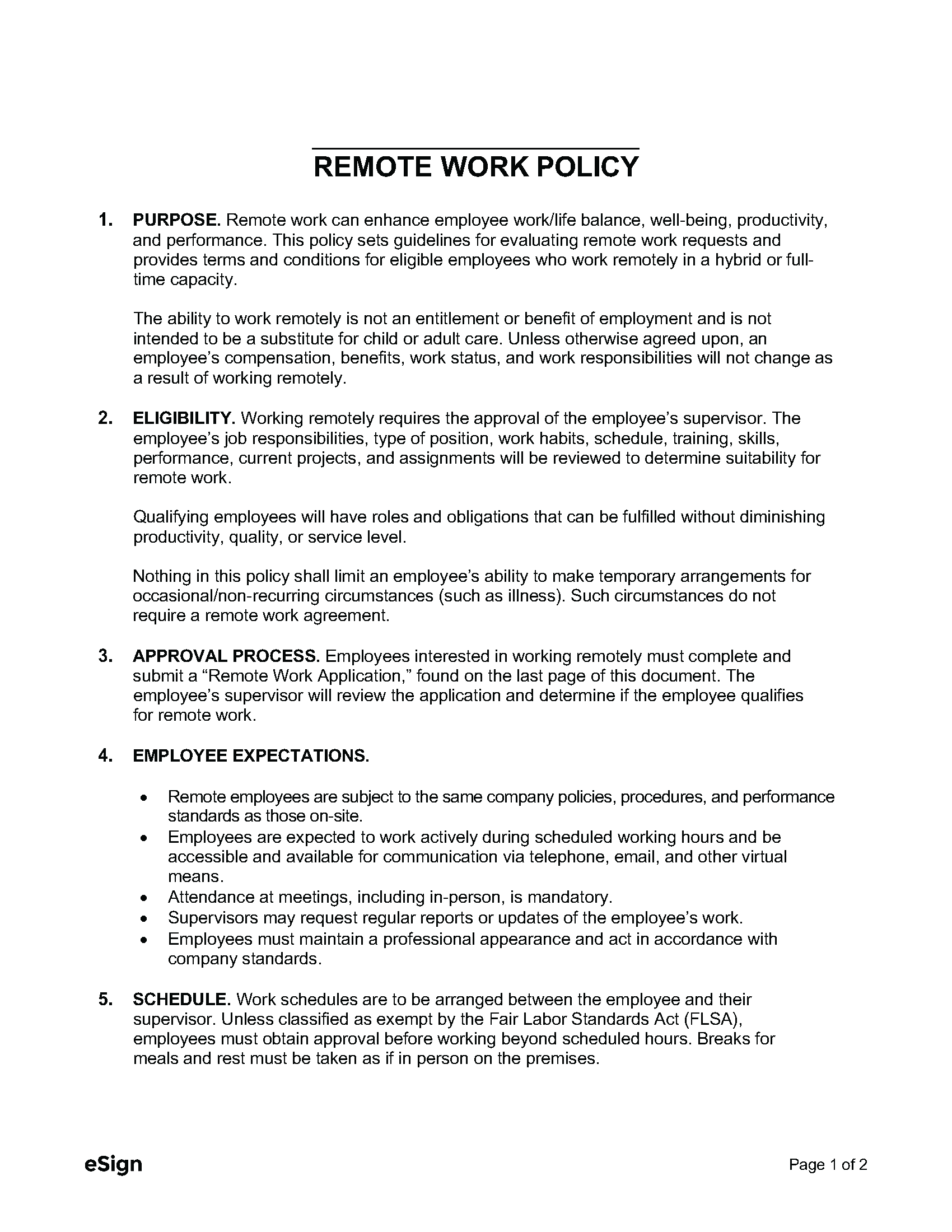Also Known As
- Work From Home Policy
- Telecommuting Policy
- Hybrid Work Policy
What to Include
A remote work policy will be catered to the company’s needs, but should include the following provisions:
- Eligibility. Employers will want to state what criteria will be considered when reviewing an employee’s request for remote work.
- Application and Approval. The policy should state how employees can request to work in out-of-office settings. Some employers may require a written application for remote work, while others may have a less formal process.
- Employee Expectations. Companies will want to clarify expectations of remote employees. These include working standards, meeting attendance, communication expectations, workspace requirements, workplace attire, and data security measures.
- Schedule. How the employee’s schedule will adapt to a remote setting should be detailed. Many policies state that nonexempt remote workers must comply with the Fair Labor Standards Act by ensuring they adhere to their designated working hours and take required breaks.
- Workers’ Compensation. The policy will often state whether employees working remotely are covered by workers’ compensation if they are injured while performing job-related tasks.
- Equipment/Supplies. The document should note any equipment and office supplies that the employer will provide to the employee.
Sample
1. PURPOSE. Remote work can enhance employee work/life balance, well-being, productivity, and performance. This policy sets guidelines for evaluating remote work requests and provides terms and conditions for eligible employees who work remotely in a hybrid or full-time capacity.
The ability to work remotely is not an entitlement or benefit of employment and is not intended to be a substitute for child or adult care. Unless otherwise agreed upon, an employee’s compensation, benefits, work status, and work responsibilities will not change as a result of working remotely.
2. ELIGIBILITY. Working remotely requires the approval of the employee’s supervisor. The employee’s job responsibilities, type of position, work habits, schedule, training, skills, performance, current projects, and assignments will be reviewed to determine suitability for remote work.
Qualifying employees will have roles and obligations that can be fulfilled without diminishing productivity, quality, or service level.
Nothing in this policy shall limit an employee’s ability to make temporary arrangements for occasional/non-recurring circumstances (such as illness). Such circumstances do not require a remote work agreement.
3. APPROVAL PROCESS. Employees interested in working remotely must complete and submit a remote work application. The employee’s supervisor will review the application and determine if the employee qualifies for remote work. If approved, the employer and employee will enter into a remote work agreement.
4. EMPLOYEE EXPECTATIONS.
- Remote employees are subject to the same company policies, procedures, and performance standards as those on-site.
- Employees are expected to work actively during scheduled working hours and be accessible and available for communication via telephone, email, and other virtual means.
- Attendance at meetings, including in-person, is mandatory.
- Supervisors may request regular reports or updates of the employee’s work.
- Employees must maintain a professional appearance and act in accordance with company standards.
5. SCHEDULE. Work schedules are to be arranged between the employee and their supervisor. Unless classified as exempt by the Fair Labor Standards Act (FLSA), employees must obtain approval before working beyond scheduled hours. Breaks for meals and rest must be taken as if in person on the premises.
6. WORKSPACE. Employees working remotely must create a safe, clean, and distraction-free work environment. A company representative may inspect the premises to ensure they comply with company policy, either in person or via video conference call.
7. WORKERS’ COMPENSATION. Employees are covered by workers’ compensation if an injury occurs while performing job-related tasks during scheduled working hours. Employees are expected to maintain a safe work environment and report any injuries that occur while performing job duties during scheduled hours.
Injuries that occur outside the employee’s designated working hours or scope of work are not covered by workers’ compensation, nor will the company assume any liability for such injuries. The company is not liable for any loss, damage, or personal injury occurring to or within the employee’s home.
8. EQUIPMENT AND SUPPLIES. The company will determine what equipment and supplies, if any, will be supplied to remote employees. Company-issued equipment is to be used for work purposes only, remains the company’s property, and must be returned upon request or upon the end of employment. Employees are responsible for protecting equipment from theft, loss, and damage. If damage occurs to company equipment, it must be reported immediately.
The company assumes no liability for any equipment owned by the employee.
9. SECURITY AND CONFIDENTIALITY. Remote workers must follow company standards, procedures, and policies to protect confidential information. Work equipment and documents must be secured, and sensitive programs and networks must be logged out of when not in use. Confidential information must always be protected from unauthorized parties.
10. TERMINATION. Remote working agreements are not considered employment contracts. Both the company and the employee may terminate the remote working agreement with written notice at any time and for any reason. The company will not be responsible for any costs, damages, or losses resulting from termination.
Upon termination of the remote work arrangement, all company-provided equipment and proprietary information must be returned from the remote workplace to the company.

